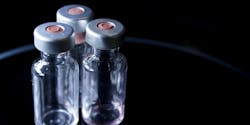Corning Inc. announced June 9 that it was accepting $204 million from the U.S. Department of Health and Human Services to ramp up domestic production of glass vaccine vials. According to Reuters, AstraZeneca and Johnson & Johnson, both of which have COVID-19 vaccines in development, have raised concerns about the available supply of the vials.
The funding was provided by the Biomedical Advanced Research and Development Authority, or BARDA, which is also helping fund COVID-19 vaccines and treatments at several United States companies. In a statement, Corning said that “designated” fellow BARDA partners would get priority access to the vial supply. Pfizer signed a long term agreement to purchase vials in May, according to Reuters.
Corning’s CEO, Wendell P. Weeks, said Corning was “delighted” to be selected by BARDA. “Corning is ready to do our part in the fight against the pandemic, as well as to help prepare for future public health emergencies.”
The vials will use Corning’s Valor glass, the result of a collaboration between Corning, Merck and Pfizer. According to Corning, the vials allow for faster filling and capping than conventional vials, reportedly increasing the manufacturing throughput by up to 50% on conventional filling lines. The money will be used to scale up manufacturing assets for the vials in three U.S. locations: Big Flats, New York; Durham, North Carolina; and Vineland, New Jersey.
Although the glass vials are used in lots of pharmaceutical products requiring sterile containment, billions of vials will be needed soon depending on how quickly Johnson & Johnson, Pfizer, AstraZeneca, and others manage to develop a viable vaccine for the novel coronavirus. Pharmaceutical companies have been working at an unprecedented pace to develop a vaccine and deploy it in roughly a year since the virus’ genetic sequence was made available in January. Such a deployment would be unprecedented in the history of epidemiology but would likely rely on emergency use authorizations.
About the Author
IW Staff
Find contact information for the IndustryWeek staff: Contact IndustryWeek
